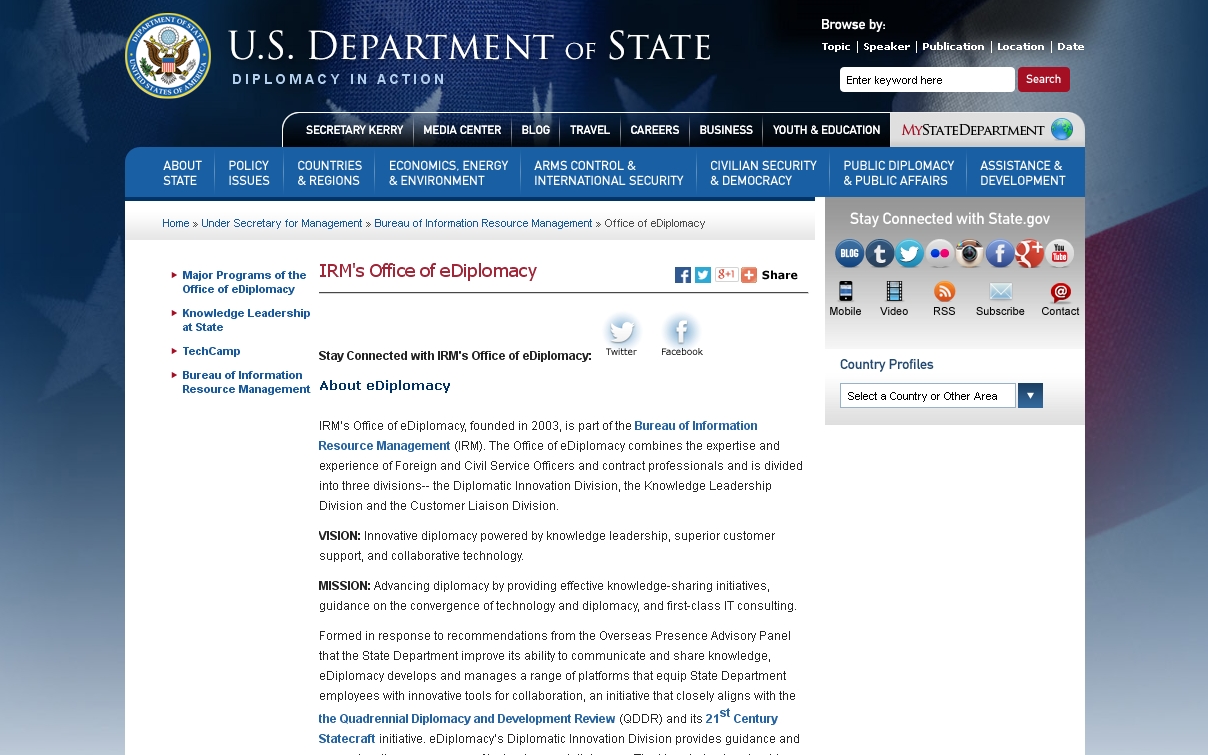|
|
|
The Office of eDiplomacy acts as an applied technology think tank for the United States Department of State. The Office of eDiplomacy combines the expertise and experience of Foreign and Civil Service Officers and contract professionals and is divided into three branches, the Diplomatic Innovation Division, the Knowledge Leadership Division and the Customer Liaison Division.
Formed in response to recommendations from the Overseas Presence Advisory Panel that the State Department improve its ability to communicate and share knowledge, eDiplomacy hosts a variety of platforms that equip State Department employees with innovative tools for collaboration, an initiative that closely aligns with Secretary Clinton’s call for 21st Century Statecraft. Through the support and advocacy of new technology like blogs, wikis, professional networking and virtual student interns, eDiplomacy promotes an organizational culture for innovation that allows State diplomats to lead the foreign policy process at home and abroad.
Customer Liaison Division desk officers facilitate and enhance communications between the Bureau of Information Resource Management and its users and strive to ensure the highest level of customer satisfaction with IRM products and services. In addition, they collaborate with other U.S. Government agencies and foreign/multinational entities to provide information services that advance our national security, emergency preparedness, and communications objectives.
Contents
History
In 2002, Ambassador James Holmes started the eDiplomacy Task Force. In 2003, the task force was reorganized into the Office of eDiplomacy. Currently, eDiplomacy falls under the Deputy Chief Information Officer for Business, Management, and Planning.
Eric Nelson is the current Director, and Christian Bendsen is the Chief of eDiplomacy’s Knowledge Leadership Division, Daniel Sheerin is Chief of the eDiplomacy Diplomatic Innovation Division and Perry Romeo is Chief of the Customer Liaison Division.[1]
Other previous eDiplomacy Directors at the U.S. Department of State include:
- Joe Johnson
- Gerry Gallucci
- Gary Galloway (acting)
- Thomas Niblock
- Stephen Smith
- Daniel P. Sheerin (acting)
- Richard Boly
Major Programs of the Office of eDiplomacy
The Office of eDiplomacy runs several knowledge-management and new media technology programs for the State Department. Among the most prominent are:
- Diplopedia is the State Department’s internal collaborative online wiki. Just as people create and edit articles on public wikis on the Internet, Department personnel use Diplopedia to create a broad, informative and expanding reference tool for knowledge-sharing about the Department, its programs and offices, and other international affairs subjects. The Department shares a read-only version of Diplopedia for internal U.S. Government interagency viewing. A classified version of Diplopedia serves as a gateway to information on the Department’s classified network.
- Communities @ State is an initiative enables and encourages Department personnel with shared professional interests to form online communities to publish information, connect with others, and create discussion. Transcending organizational boundaries and geographic constraints, these websites use a simple blogging tool to allow online community members to efficiently publish deliberative content. By choice of the community administrators, most of these online communities are available to members of the interagency foreign affairs community.
- Corridor is the State Department’s professional networking platform for all personnel with access to State’s OpenNet network. Although similar to external networking sites, Corridor is oriented towards the Department’s foreign affairs professionals and personnel from other agencies who use OpenNet. It enables members to post their profiles; expand their professional network of connections; tap into the experience and expertise of colleagues worldwide; and form groups to communicate and collaborate based on shared professional and personal interests.
- The Virtual Student Foreign Service (VSFS) program is part of a growing effort by the State Department to harness technology and a commitment to global service among young people to facilitate new forms of diplomatic engagement. Working from college and university campuses in the United States and throughout the world, US citizen college students can engage with State Department domestic offices and US diplomatic posts overseas through nine-month virtual internships (eInternships). In early 2012, VSFS will expand to include crowd-sourcing through a micro-volunteering platform, allowing even more US college students an opportunity to conduct digital diplomacy, reflecting the realities of our networked world.
- TechCamps, a series of training events in cities around the world, are rapidly meeting the objectives of Secretary Clinton’s Civil Society 2.0 initiative. TechCamps are one to two day interactive conferences that bring together top technology experts with local and regional civil society organizations to provide training and strategic planning, with a focus on developing local solutions to local problems. TechCamps connect the organizations and entities that are working hard to solve social problems—NGO’s, educational institutions, activists, community groups, etc.– with technologists that have access to easy-to-implement, low-cost technologies that they can often put to use immediately. Helping to accomplish goals like promoting their organization, recruiting new members, educating the public, raising money, mapping strategic data, using mobile apps, and building organizational capacity. They also convene private sector and foundation partners, to help ensure that viable solutions are sustainable long after participants return home.
- Tech@State connects technologists to targeted goals of the U.S. diplomacy and development agenda via networking events that combine physical and virtual presence. As part of Secretary Clinton’s 21st Century Statecraft initiative, Tech@State connects established leaders, new innovators, government personnel, and others to work together on 21st century technology solutions to improve the education, health, and welfare of the world’s population.
- The enterprise search project provides a versatile set of search tools to find knowledge resources on State’s unclassified intranet and certain State Department Internet web sites.
- This is an eDiplomacy D-I-Y project. Diplomatic posts can create Virtual Presence Posts (VPP) to broaden engagement with key cities, communities, regions, and countries without an American embassy or consulate building. Virtual Presence Posts may be a website or social networking platform whereby diplomats in nearby embassies or consulates may coordinate or showcase travel, public outreach programs, media events, or online webchats to create a “virtual” presence that is quite real to local populations.
- After developing and launching the State Department Sounding Board in 2009, Office of eDiplomacy staff actively contribute to this internal idea sharing forum, now managed by the Management Bureau and the Secretary of State‘s cadre.
- Remote access and teleworking.
- Virtual Work Environments: eDiplomacy is poised to play a leading role in the Windows SharePoint Services (WSS) adoption effort at State. The State Messaging and Archive Retrieval Toolset (SMART) program is heading the WSS deployment effort.[2]
Criticism
In November 2013 Ukrainian MP Oleh Tsariov demanded a criminal investigation into the activities of TechCamp in Ukraine because he believed it was “preparations for inciting a civil war” because during training “instructors share their experience of Internet technologies, which are aimed at shaping public opinion and enhancing the protest potential and which were used to organize street protests in Libya, Egypt, Tunisia and Syria”.[3]
Innovation
At the April 2012 FOSE IT exhibition, eDiplomacy demonstrated an innovative approach to presentations, using a Kinect sensor to move through a Prezi slide presentation.[4]
External Awards and Recognition
- 2012 Rising Star Award – Kimberly Allred [5]
- 2012 Information Week Top 15 Government IT Innovators [6]
- 2012 Causey Award – Laura Williams, eDiplomacy Liaison Officer [7]
- 2012 Service to America Medals Finalists – Director Richard Boly Office of eDiplomacy[8]
- 2012 ComputerWorld Honors Program Laureate in Emerging Technology.[9]
- 2012 Fed 100 Awards – Noel Dickover (TechCamps).[10]
- 2011 Rising Star Award – Jamie Findlater [11]
- 2011 Rising Star Award – Bridget Roddy [12]
- 2011 Rising Star Award – Paul Swider [13]
- 2010 NextGov Award – Tiffany Smith [14]
Other Media Mentions
- Advancing U.S. Foreign Policy through eDiplomacy
- Updates on the Office of eDiplomacy
- State Department using Collaboration and Social for Operational Effectiveness
- eDiplomacy Ushers In a New Culture of Collaboration at State
See also
- Government crowdsourcing
- State Department Sounding Board
- Transformational Diplomacy
- United States Department of State
- United States Cyber-Diplomacy
References
- http://www.state.gov/m/irm/ediplomacy Office of eDiplomacy
- Bain, Ben (2008-06-23). “State Department will get SMART”. FCW.com (Federal Computer Weekly). Retrieved 2008-07-20.
- Party of Regions MP Tsariov accuses US Embassy in Ukraine of training revolutionaries for street protests, Interfax-Ukraine (20 November 2013)
- Lee, Jolie (2012-04-06). “Video gaming inspires new tools at State”. FederalNewsRadio.com. Retrieved 2012-04-08.
- “Rising Star: Kimberly Allred”(2012-9-18). FCW.com (Federal Computer Week). Retrieved 23 September 2012.
- Foley, John (2012-9-12).“State Department”. InformationWeek.com (Information Week). Retrieved 23 September 2012.
- “2012 Causey Awards Announced”(2012-7-16). FederalNewsRadio.com. Retrieved 3 August 2012.
- “Samuel J. Heyman Service to America Medals 2012 Finalist—National Security and International Affairs Medal: Richard Boly”, 2012. Retrieved 3 August 2012
- “The Computerworld Honors Program – Final Copy of Case Study: eDiplomacy”, 2012. Retrieved 3 August 2012
- Lipowicz, Alice(2012-3-28). “Federal 100: Noel T. Dickover”. FCW.com (Federal Computer Week). Retrieved 3 August 2012
- “Jamie Findlater: A diplomat for social media”(2011-10-10). FCW.com (Federal Computer Week). Retrieved 3 August 2012.
- “Bridget Roddy: A view of the world”(2011-10-10). FCW.com (Federal Computer Week). Retrieved 3 August 2012.
- “Paul Swider: Pioneer of Tech@State”(2011-10-10). FCW.com (Federal Computer Week). Retrieved 3 August 2012.
- “2010 Nextgov Award Winners Announced”(2010-6-3). PRWeb.com. Retrieved 3 August 2012.







